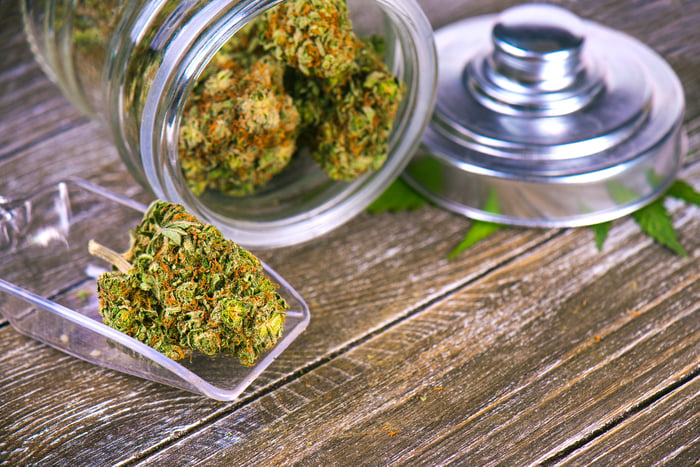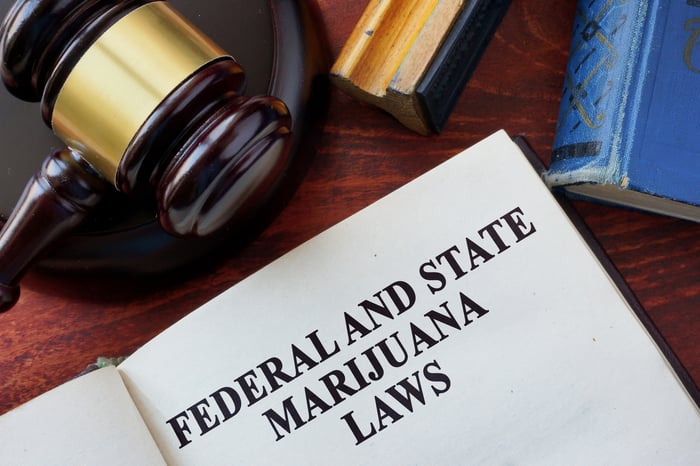For more than a year now, all eyes have been on Canada. The introduction of Bill C-45, which you might know better as the Cannabis Act, outlined a means to legalize recreational marijuana in our neighbor to the north. Since no developed country has ever legalized adult-use weed before, businesses and investors saw billions upon billions of dollar signs dancing in their heads.
This long-running expectation of legalization is what's pushed Canada's growers to expand their production capacity at an incredibly quick pace. For instance, Aurora Cannabis had begun the year with a little over 100,000 kilograms in expected peak annual production. Now, following two monstrous acquisitions (one of which is ongoing), a new partnership, and the announcement of another massive greenhouse project, Aurora Cannabis is staring down 570,000 kilograms in peak annual production, at full capacity.

Image source: Getty Images.
The story is similar for Canopy Growth Corp., which has tripled its licensed growing capacity to 2.4 million square feet through the first five months of 2018, and has plans to push its licensed grow space to 5.7 million square feet. These two pot juggernauts could produce well over 1 million kilograms of cannabis a year between them.
Forget Canada! This is a much more important vote
Yet, for as intriguing a story as legalization makes in Canada, it may not be as big of a game changer as what GW Pharmaceuticals (GWPH) looks poised to do in the United States.
You see, the U.K.-based cannabinoid-based drug developer has its lead drug, a cannabidiol (CBD)-based oral medicine known as Epidiolex, under review by the Food and Drug Administration (FDA) for the treatment of two rare types of childhood-onset epilepsy, Dravet syndrome and Lennox-Gastaut syndrome. CBD is the nonpsychoactive component of the cannabis plant that's perhaps best known for its perceived medical benefits.
At no point in history has the FDA ever approved a drug derived from the cannabis plant. Sure, synthetic versions of tetrahydrocannabinol (THC), the psychoactive component of the cannabis plant that gets you "high," have been given the OK, but never a cannabinoid-based drug derived directly from the cannabis plant.

Image source: GW Pharmaceuticals.
In numerous pivotal-stage clinical studies, Epidiolex met the mark of statistical significance with regard to reducing seizure frequency relative to baseline and a placebo. In one Dravet syndrome study, Epidiolex produced a three times' greater reduction in seizure frequency from baseline (39% vs. 13%) relative to the placebo. Meanwhile, a Lancet-published study on Lennox-Gastaut patients found that Epidiolex doubled the median reduction in drop seizures from baseline (44% vs. 22%) relative to the placebo.
In mid-April, the FDA's advisory panel reviewed Epidiolex's clinical data and recommended it for approval in a unanimous vote. Though the FDA isn't bound by the opinion of its advisory panel, it tends to follow its suggestion more often than not.
With no FDA-approved treatments for Dravet syndrome, and few FDA treatments available for Lennox-Gastaut syndrome, Epidiolex has the potential to come roaring out of the gate, if approved on or before its June 27, 2018, PDUFA date.
The bigger meaning behind an Epidiolex approval
However, there's a far bigger meaning to Epidiolex's approval than just giving Dravet syndrome and Lennox-Gastaut syndrome patients a means to combat their diseases. The FDA recognizing that a cannabinoid-based drug has medically beneficial properties could completely alter the way CBD, or perhaps even medicinal cannabis, is viewed at the federal level in the United States.
As a Schedule I drug, marijuana is wholly illegal, considered to be highly prone to abuse, and has no recognized medical benefits. But if Epidiolex gets a nod from the FDA, there would no longer be any doubt about it -- cannabis, or at least one of its best-known cannabinoids, would have a recognized medical benefit. That could prove pivotal with regard to inciting reforms at the federal level.

Image source: Getty Images.
What might those reforms look like? Right now, 29 states have passed some form of broad-based medical cannabis law, while another 17 have allowed access to CBD for patients with a narrow scope of ailments. Four states completely ban CBD. The passage of Epidiolex could open the floor for debate with regard to rescheduling, or completely descheduling, CBD. This would allow patients in all 50 states access to cannabidiol oils and CBD-based drugs, as well as give CBD drugmakers like GW Pharmaceuticals and Medical Marijuana, Inc. access to a suddenly larger patient pool.
Another possibility is that GW Pharmaceuticals' approval of Epidiolex could be the catalyst that causes lawmakers in Congress to take up debate on rescheduling marijuana, or removing it entirely from the controlled substances list. Admittedly, this isn't nearly as likely as CBD alone being reviewed given that Republicans are in control of the legislative branch of the federal government, and they have a markedly more negative view of marijuana than Democrats or Independents. Still, a green light from the FDA on Epidiolex would pack more firepower for the movement to legalize medicinal cannabis than two decades of state-level approvals have.
While I'm unwilling to venture a guess as to what the federal government will do, there does appear to be a very good chance at this point that GW Pharmaceuticals will receive approval from the FDA in a matter of weeks. Even if Epidiolex fails to live up to Wall Street's peak annual sales projections, which for Cowen Group tops more than $1 billion a year in estimated sales, its legacy with regard to what it might do for CBD and/or medical cannabis reform could prove far more important.





